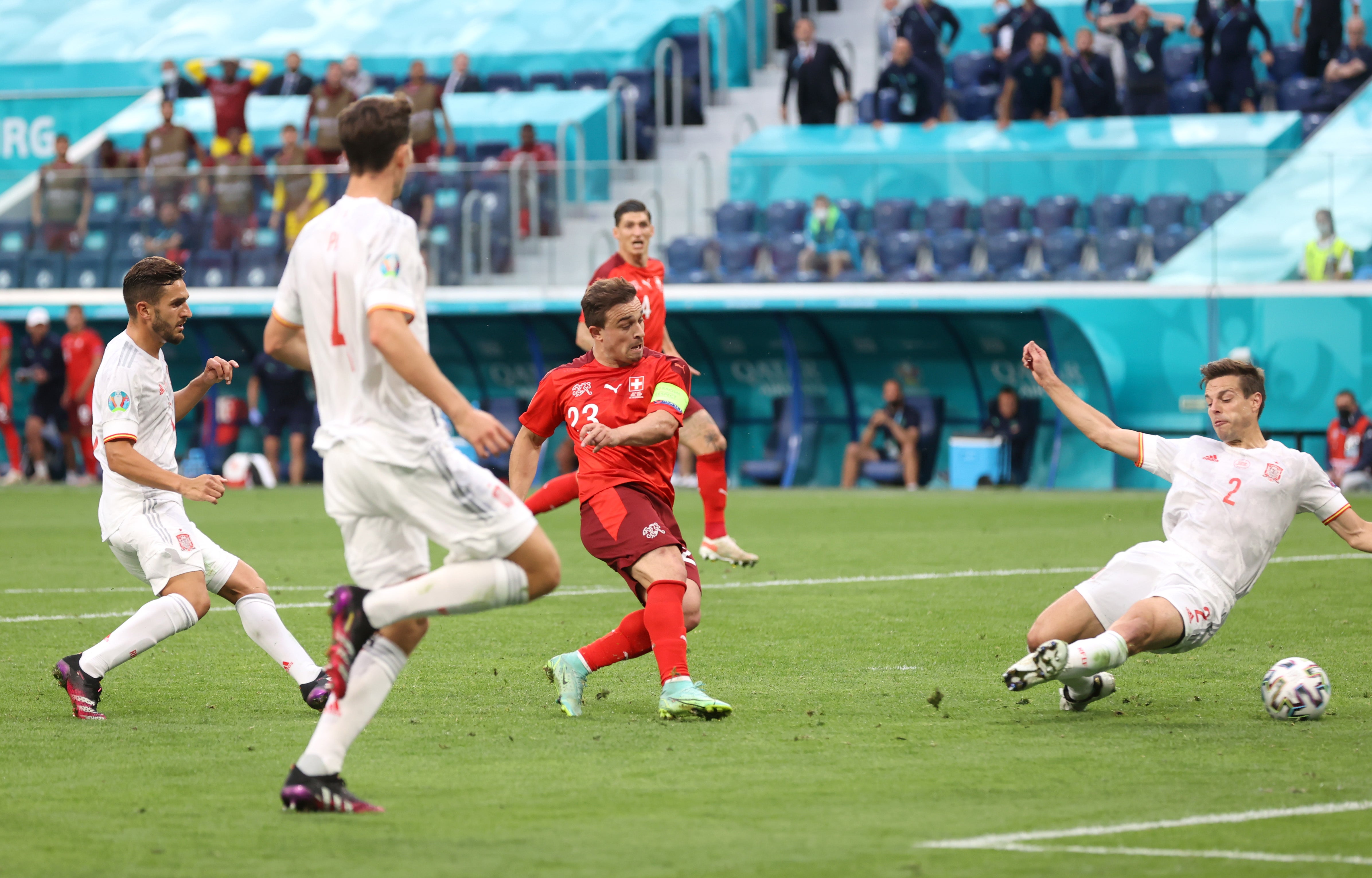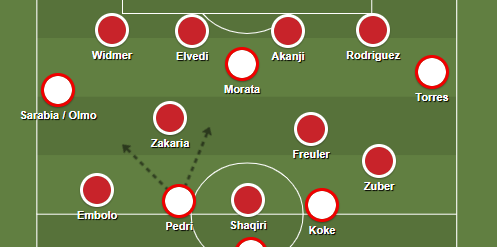How Switzerland’s tactical gamble fell agonisingly short as Spain squeeze into Euro 2020 semi-finals
In switching to 4-4-2, Switzerland offered Spain chances from wide areas, but it was a calculated risk that paid off as Vladimir Petkovic’s side forced their opponents to penalties

Your support helps us to tell the story
From reproductive rights to climate change to Big Tech, The Independent is on the ground when the story is developing. Whether it's investigating the financials of Elon Musk's pro-Trump PAC or producing our latest documentary, 'The A Word', which shines a light on the American women fighting for reproductive rights, we know how important it is to parse out the facts from the messaging.
At such a critical moment in US history, we need reporters on the ground. Your donation allows us to keep sending journalists to speak to both sides of the story.
The Independent is trusted by Americans across the entire political spectrum. And unlike many other quality news outlets, we choose not to lock Americans out of our reporting and analysis with paywalls. We believe quality journalism should be available to everyone, paid for by those who can afford it.
Your support makes all the difference.Coming into Euro 2020, Switzerland were one of several teams committed to playing three at the back. Like a fine Swiss watch, you could rely on Vladimir Petkovic’s side lining up in a 3-4-1-2 formation, but as they trailed France 3-1 in their round of 16 tie, the manager made an adjustment that would ultimately produce one of the most memorable comebacks at a major international tournament.
With elimination on the line, Petkovic switched to a 4-4-2 formation as they mounted their extraordinary two-goal comeback, before sticking with the system as they battled through extra time and forced penalties against the tournament favourites. It proved to be an effective call, so much so that he retained the setup for the clash against Spain, in what was the country’s first ever quarter-final at a European Championship.
On the face of it, it perhaps shouldn’t have been a surprise. Switzerland may have started the last 10 international fixtures with a back three, going all the way back to October 2020, but on that occasion it was in a 1-1 draw against Spain in a Nations League match. Perhaps buoyed by the memories of that result, as well as the recent success of his switch against France, you could see why Petkovic had kept his 4-4-2.
It was a bold call that ultimately paid off as Switzerland forced Spain into extra time and penalties, with the scoreline locked at 1-1 after 90 minutes. The system may have put Switzerland on the back foot at times, but it once again gave them a route into the game when their backs were up against the wall.
Against a more clinical team, Switzerland could have been put to bed by half time, but against Spain their tactical switch felt like a reasonable gamble to make. Luis Enrique likes to play with a wide front three and as the tournament has progressed has landed upon a front three of Alvaro Morata, Ferran Torres and Pablo Sarabia, the latter two players preferring to play as traditional wide men.
Switzerland’s narrow back four allowed Sarabia and Torres to hug their respective touchlines in an opening half dominated by La Roja. Both players stayed extremely wide and looked to deliver the ball early into the box. The Swiss full-backs, Silvan Widmer and Ricardo Rodriguez, struggled to deal with this threat - particularly when Spain were able to quickly switch play.
With Sergio Busquets and Pedri in the side, that was something Spain were able to do effortlessly. Switzerland tried their best to shut this down, with Denis Zakaria paying close attention to Pedri and Xherdan Shaqiri often dropped back to close down Busquets, but it wasn’t enough. Often, Pedri was able to read Zakaria’s pressure behind him before either turning into space or playing the ball around the corner to a free team-mate, which sparked Enrique’s side into life.

It was occasions such as these that Spain were able to open Switzerland up. Either by playing the ball out to the touchline to one of their wingers, who were in 20 yards of space, or by driving through the gaps in midfield that had been vacated by their positioning on the flanks. The Spanish had a number of half-chances, particularly in the second half of normal time, which all came from wide areas.
Torres found Morata with a low ball into the box but the striker couldn’t turn. Dani Olmo, brought on for Sarabia at half-time, continued to do the same. He set up Koke who headed over. Gerard Moreno, another substitute, pulled wide before finding Cesar Azpilicueta's underlapping run, but there was no one to finish his cutback. Moreno then had Spain’s best chance in extra-time, as he fired wide Jordi Alba’s first-time cross from less than six yards.
It was opportunities such as these which in some ways validated Switzerland’s approach, as if Petkovic was comfortable allowing Spain space in wide areas in the hope that their opponents lacked the finishing touch once the ball was delivered into the box, with Yann Sommer always at hand to make a final intervention if needed.

Switzerland survived the pressure and the irony was that once they found themselves 1-0 down, 4-4-2 was the best way for them to get back into the game. Switzerland’s best spell of the match, which culminated in Shaqiri’s equaliser but also included a decent opportunity for Steven Zuber, came from Petkovic’s side pressing Spain higher up the pitch and committing more numbers to their attacks. When in possession, Switzerland played more like 4-2-4 at times as they once again chased the game, which made things uncomfortable for Spain for a moment, but it was a period of the game that ended when Remo Freuler’s was shown a straight red card.
The Swiss once again showed a lot of heart as they defended superbly with 10 men in extra time, but still had to rely on Sommer making a number of important saves to force penalties. In the end, it wasn’t to be for Petkovic’s side as Spain advanced to the semi-finals. La Roja were the better team and deserved to through on the balance of play, but Switzerland had given themselves every chance with another impressive bold performance at Euro 2020.
Join our commenting forum
Join thought-provoking conversations, follow other Independent readers and see their replies
Comments